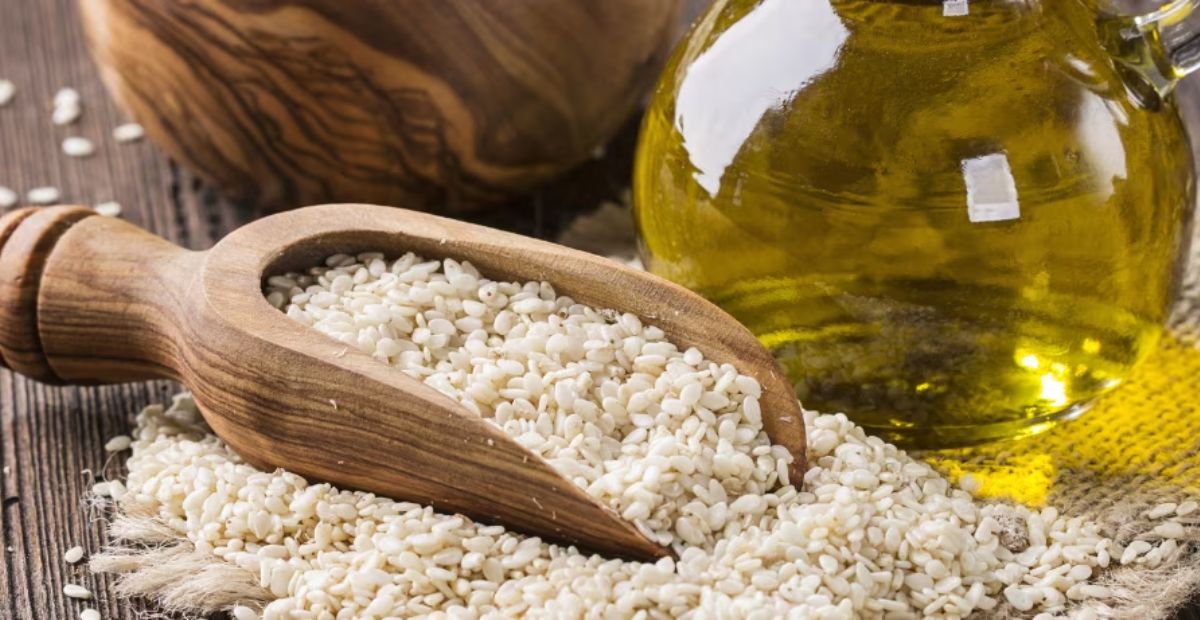During the winter, these treats—from the fragrant til chikkis to the healthy tilgur (sesame and jaggery) laddoos and the luxurious til-patti—are more than just treats; they’re a tradition that brings happiness and coziness. There are many Sesame seeds benefits.
Sesame is a food that is good for your health in many ways. A lot of heart-healthy antioxidants are in it. These protect the liver and kidneys, lower cholesterol, and improve heart health. As a highly versatile ingredient, sesame is used in many fields, such as medicine, food, animal feed, and cosmetics. Sesame is a popular choice among health-conscious people because of its unique chemical makeup, nutritional profile, and pharmacological Sesame seeds benefits. Sesame is a great ingredient to add taste and health benefits to a dish.
Sesame seeds, which are also called “til,” are full of essential nutrients. Not only are sesame seeds high in zinc, calcium, iron, and phosphorus, but they are also high in protein, fiber, and healthy fats. They also have essential antioxidants and vitamins, like vitamin E and B-complex vitamins.
In This Article
A Great Source of Fiber
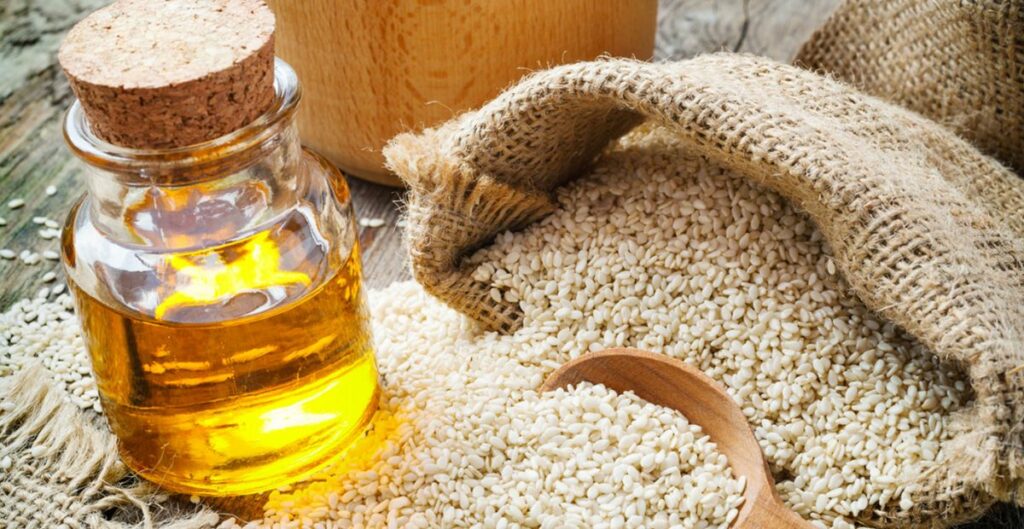
It takes three tablespoons (30 grams) of unsalted sesame seeds to get 3.5 grams of fiber, which is 12% of the daily suggested intake (RDI).
In the US, people only eat half of the recommended daily amount (RDI) of fiber. Adding sesame seeds to your daily diet may help you satisfy your fiber needs.
Everyone knows that fiber is suitable for your gut system. Moreover, more and more evidence suggests that eating fiber may lower the chance of getting type 2 diabetes, heart disease, some cancers, and being overweight.
Potential Reduction in Cholesterol and Triglycerides
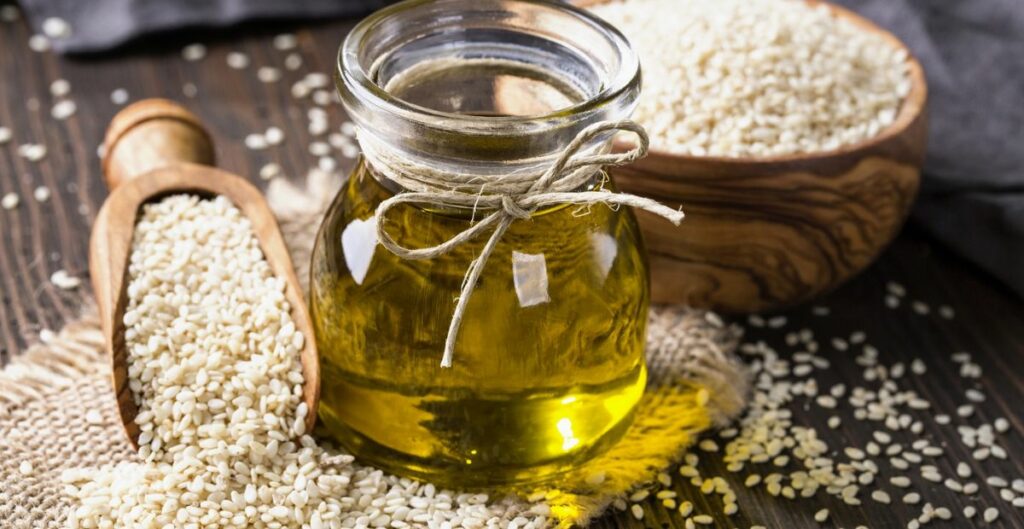
Some studies show that eating sesame seeds regularly may lower triglyceride and cholesterol levels, which are both things that can put you at risk for heart disease.
Sesame seeds have 39% monounsaturated fat, 15% saturated fat, and 41% polyunsaturated fat.
According to studies, eating more monounsaturated and polyunsaturated fats instead of saturated fat may help lower cholesterol and keep you from getting heart disease.
Phytosterols and lignans are two types of plant chemicals that are found in sesame seeds. They may also help lower cholesterol.
Thirty-eight people with high blood lipids who ate 5 cups (40 grams) of hulled sesame seeds every day for two months had 10% less “bad” LDL cholesterol and 8% less triglycerides than the people in the placebo group.
Sesame seeds benefits include it may lower risk factors for heart disease, like high amounts of triglycerides and “bad” LDL cholesterol.
Nutritious Source of Plant Protein
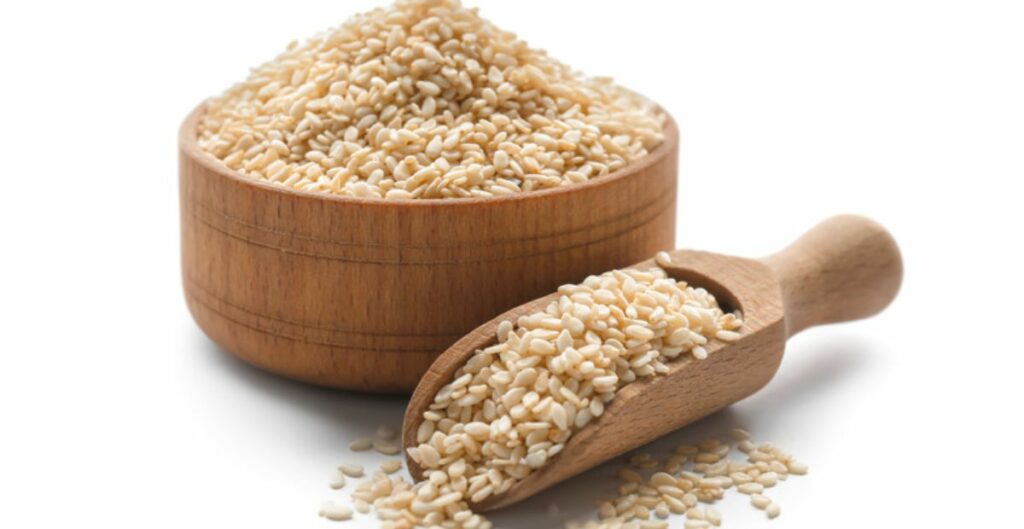
Three tablespoons (30 grams) of sesame seeds have five grams of protein in them.
To make protein more accessible to get, choose roasted sesame seeds that have been hulled. Phytates and oxalates are chemicals that make it harder for the body to digest and absorb protein. The hulling and roasting processes get rid of them.
Protein is essential for your health because it is used to make enzymes and muscles.
Sesame seeds benefits include it have a meager amount of lysine, an essential amino acid that is more common in animal goods. Vegans and vegetarians can make up the difference by eating legumes like chickpeas and kidney beans, which are high in lysine.
On the other hand, Sesame seeds benefits include having a lot of the amino acids cysteine and methionine, while beans don’t have a lot of them.
Sesame seeds benefits include they are a great way to get protein, which is an essential building block for the body.
Potentially Reduce Blood Pressure
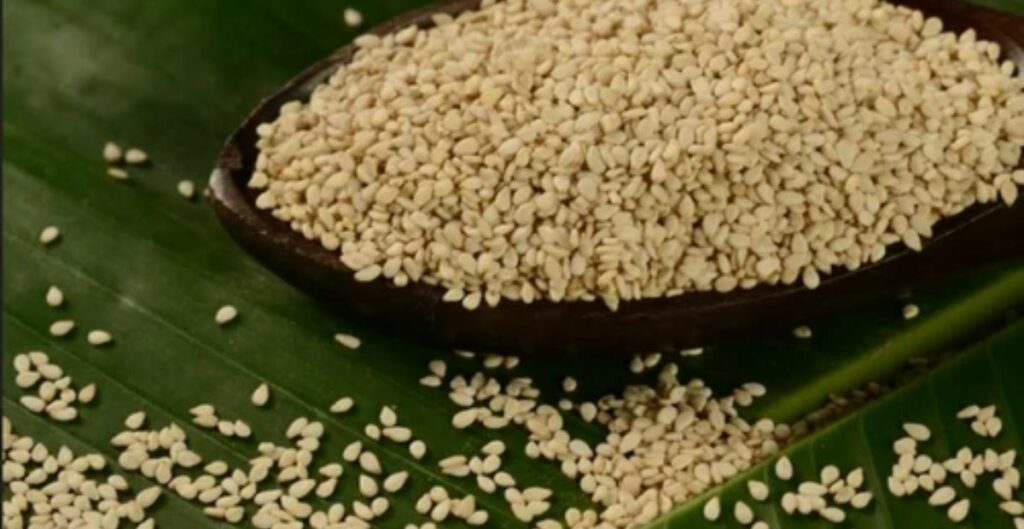
High blood pressure makes the chance of heart disease and stroke much higher.
Sesame seeds benefits include it have a lot of magnesium, which may help lower blood pressure.
Sesame seeds also have lignans, vitamin E, and other antioxidants that might stop the buildup of cholesterol in the arteries, which could help keep blood pressure in a healthy range.
In one study, people with high blood pressure took 2.5 grams of crushed black sesame seeds (a rare type) every day in the form of capsules.
By the end of the month, their systolic blood pressure—the highest number on a blood pressure reading—had dropped by 6% compared to the control group.
Sesame seeds benefits include it have a lot of magnesium, which may help lower blood pressure. The vitamins in them may also help keep plaque from building up.
Support Healthy Bones
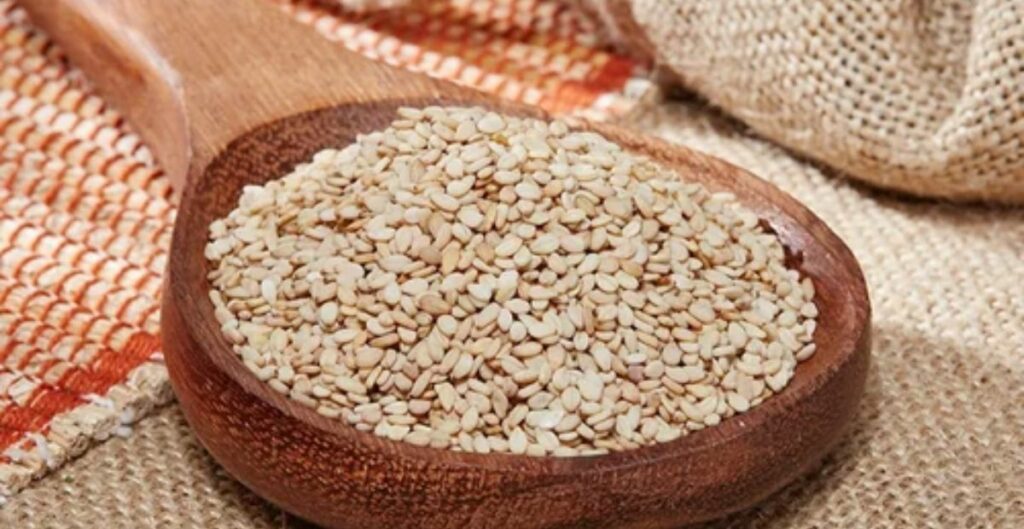
Whether they are hulled or not, sesame seeds are full of nutrients that are good for bones. The hull, in particular, has most of the calcium.
Thirty grams, or three teaspoons, of sesame seeds give you:
• However, Sesame seeds benefits include naturally containing substances called oxalates and phytates that stop the body from absorbing these minerals.
• Soak, roast, or sprout the seeds to lessen the effect of these chemicals.
• According to one study, growing hulled and unhulled sesame seeds cut the amounts of phytate and oxalate by about half.
• Sesame seeds that have not been hulled have a lot of calcium and other nutrients that are good for bones. Sesame seeds can absorb more minerals if they are sprouted, toasted, or soaked.
Lessen Inflammation
Sesame seeds may help with pain and swelling.
Low-level, long-term inflammation may play a role in the development of many long-term diseases, including cancer, obesity, heart disease, and kidney disease.
People with kidney disease who ate a mix of 18 grams of flax seeds, 6 grams of sesame seeds, and pumpkin seeds every day saw a 51.79% drop in their inflammatory markers over three months.
Because this study looked at a mix of seeds, we need to find out what the anti-inflammatory qualities of sesame seeds alone are.
However, studies on animals have shown that sesame seed oil can also help reduce inflammation.
This might be because of sesamin, a chemical that is found in sesame oil and grains.
A Great Source of B Vitamins
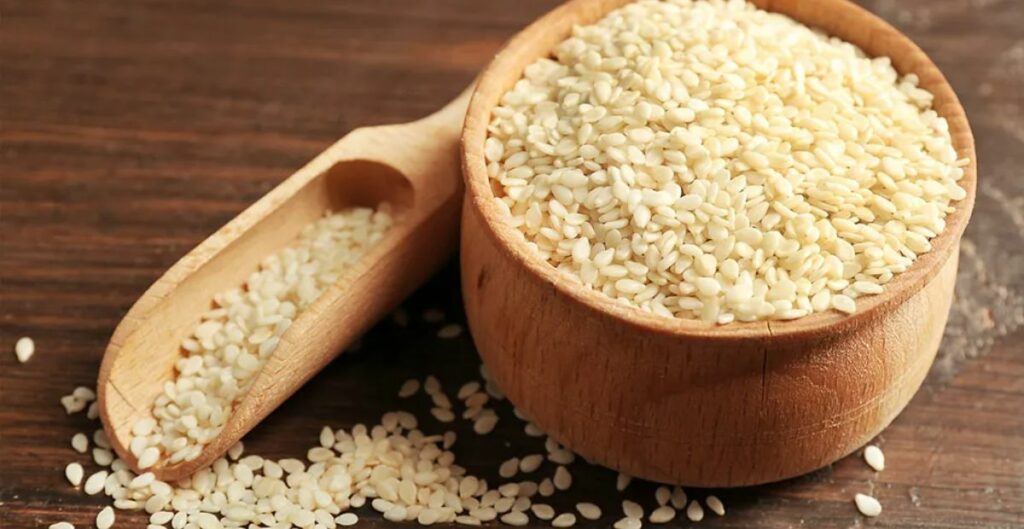
There are a lot of specific B vitamins in sesame seeds. They can be found in both the hull and the seed.
When the hull is taken off, some of the B vitamins may be lost or concentrated.
Three cups (30 grams) of sesame seeds, with and without the shells, give you:
B vitamins are needed for many bodily functions, such as metabolism and cell activity.
Aid Blood Cell Formation
Different nutrients are needed to make red blood cells, and some of them can be found in sesame seeds.
This is what thirty grams (three tablespoons) of sesame seeds give you:
If you sprout, cook, or soak sesame seeds, they may be better at absorbing minerals.
Keep Blood Sugar in Check
There are not many carbs in sesame seeds, but they are high in healthy fats and protein. These nutrients may help keep blood sugar levels steady.
In addition, Sesame seeds benefits include these seeds contain pinoresinol, a chemical that may help control blood sugar by stopping the gut enzyme maltase from working.
It is broken down and used as a sweetener in some foods. Maltose is a sugar Maltese. It is also made when carbohydrate-rich foods, like bread and pasta, are broken down.
Having lower blood glucose levels could happen if pinoresinol stops the breakdown of maltose. Still, studies involving people are needed.
Rich in Antioxidants
There is evidence from studies on both animals and people that eating sesame seeds may increase the amount of antioxidants in the blood.
Lignans in sesame seeds are antioxidants that help fight oxidative stress, a chemical reaction that can damage cells and raise the risk of getting many chronic illnesses.
Sesame seeds benefits include it also have gamma-tocopherol in them, which is an antioxidant type of vitamin E that may help protect against heart disease even more.
It is the plant chemicals and vitamin E in sesame seeds that protect the body from oxidative stress.
Support Your Immune System
There are a lot of essential nutrients in sesame seeds, like zinc, selenium, copper, iron, vitamin B6, and vitamin E.
For example, zinc is needed for the growth and stimulation of specific white blood cells that find and kill microorganisms that are trying to infect the body.
Remember that even a low to moderate zinc deficiency can make it harder for your immune system to work.
Three tablespoons (30 grams) of sesame seeds have twenty percent of the daily suggested amount (RDI) of zinc.
Soothe Arthritic Knee Pain
Osteoarthritis is the most common cause of joint pain, and it usually shows up in the knee.
Many things can lead to arthritis, such as inflammation and damage to the cartilage that cushions joints from free radicals.
Sesamin, an anti-inflammatory and antioxidant found in sesame seeds, may help protect cartilage.
As part of a two-month study, people with knee arthritis took five tablespoons (40 grams) of sesame seed powder every day along with their medication. In this group, knee pain went down by 63%, but in the group that only got drugs, it only went down by 22%.
There were also more significant improvements in a primary movement test and smaller drops in specific inflammatory markers in the sesame seed group compared to the control group.
Support Thyroid Health
Sesame seeds, both hulled and unhulled, have a lot of selenium. In fact, they have 18% of the RDI.
The thyroid gland has the highest amount of selenium compared to all the other organs in the body. This chemical is essential for making thyroid hormones.
You can also get a lot of vitamin B6, iron, copper, and zinc from sesame seeds. All of these nutrients are good for your thyroid and help it make hormones.
Aid Hormone Balance During Menopause
In sesame seeds, you can find phytoestrogens, which are plant chemicals that look a lot like the hormone estrogen.
This means that sesame seeds might be good for women during menopause when estrogen levels drop. For example, phytoestrogens may help with heat flashes and other problems that come with not having enough estrogen.
Also, these chemicals may lower the chance of getting some cancers, like breast cancer, during menopause. Still, more research needs to be done.
Simple to Incorporate Into Your Diet
Sesame seeds can give many foods a delicate texture and a nutty taste.
To make sesame seeds taste better and be easier to find, roast them at 350℃ (180℃) for a few minutes, stirring them now and then until they turn a pale brown color.
You might want to add sesame seeds to:
• stir-fries
• steamed broccoli
• hot or cold cereal
• granola and granola bars
• bread and muffins
• crackers
• yogurt
• smoothies
• salads
• salad dressing
• hummus
• garnishes
You can also use tahini, which is sesame seed butter, instead of hummus or peanut butter. Sesame flour, which is also called sesame seed meal, is made by grinding sesame seeds. It can be used in cooking, soups, and fish batter, among other things.
But because more people are allergic to sesame, it might be best to be careful when making food for a lot of people.
Conclusion:
Sesame seeds are very healthy and may have many other sesame seeds benefits. Besides that, they have protein, fiber, and good fats. Besides calcium, they also have B vitamins, vitamin E, and other minerals and vitamins. Because they are antioxidants, sesame seeds may help reduce oxidative stress and help avoid health problems like heart and brain diseases.
Toasted or raw sesame seeds are easy to put on top of food, and tahini and sesame seed oil can be used in many recipes. For safety reasons, people who are allergic to sesame should not eat any goods that contain sesame, like tahini, sesame seeds, or sesame oil.
Also Read:

